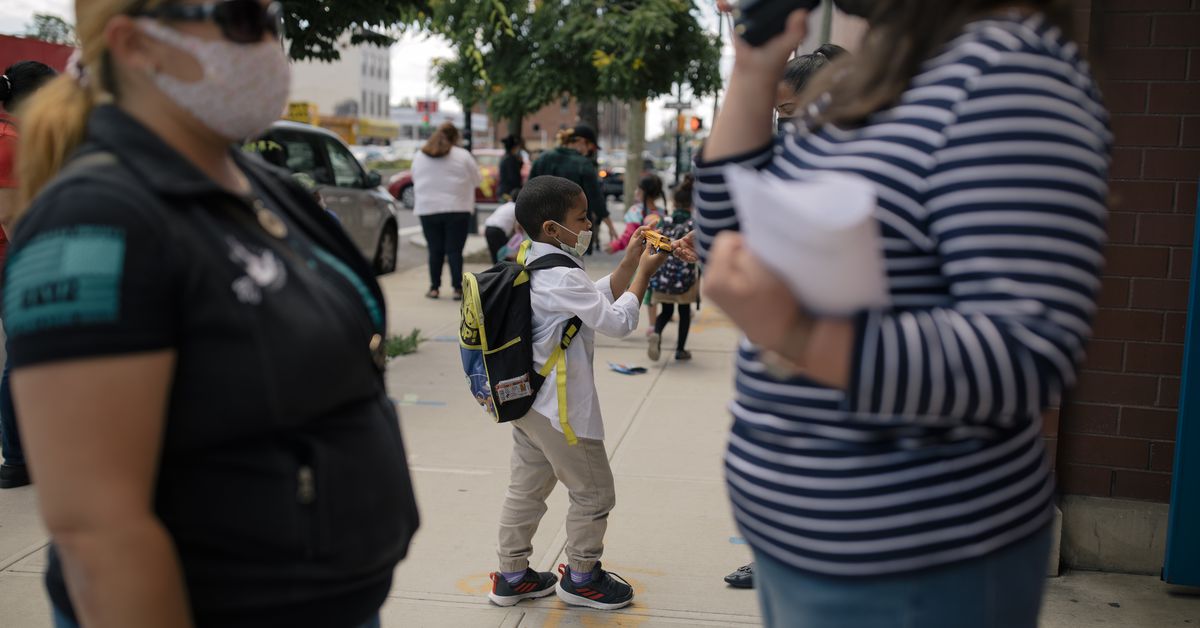Students petition College of Education to address problems with 5th-year teaching internship
In the petition, students are asking for greater transparency from the College of Education in general, making the program more accessible for low-income and first-generation students and greater support of students’ mental health while participating in the internship.
The Director of the Teacher Preparation Program, Dr. Gail Richmond, said that the College of Education is aware of the petition and is actively working to address the concerns about the internship program.
“I believe that their concerns are genuine, they’re not, you know, nobody’s trying to pick a fight,” said Richmond. “In some ways, I’m pleased, because part of the program is saying is, part of what’s embedded in the program is for them to stick up for what they believe, and they clearly believe in this. And I believe that a number of those concerns are legitimate.”

The fifth-year program for teaching students is a three-year program allowing students to complete their teaching certification in five years. The final year is a year-long unpaid internship that allows students to work in a classroom for an entire year, gaining experience in the field.
Along with the internship, fifth-year students have to complete 24 credit hours worth of classes. According to the MSU tuition calendar, the total cost of the program is $16,092 for in-state students, $34,932 for out-of-state students and $35,082 for international students, which covers the required courses and the costs of the internship.
Participation in the internship requires that students have completed their undergraduate teaching degree already.
The internship program is one of the pillars of the success of the College of Education, which ranks first in the nation in elementary and secondary education according to a report from the U.S. News. However, members of the program are calling for changes.
With the internship being a full 40 hour work week and the cost of the program itself, students are unhappy with the state of the program, saying that it has unrealistic expectations of its participants.
“I think it’s bringing to light, a lot of light, just to the exploitative nature of unpaid internships in general, but especially considering that we are taking courses that do count towards certification, but don’t count towards a degree,” Secondary Education senior Olivia Gundrum said, who created the initial survey about the program. “So those feel like just credits that we’re paying for that go nowhere. And we’re working full time and we graduate with more debt than we would if we just had an undergrad.”
Julia Alvarez, a current student and intern in the fifth-year program, and Gundrum created the survey in November for the students in the College of Education, asking for their opinion about the internship program. The results were overwhelmingly negative.
Of the 147 survey respondents, 82% of students said that the price of the program was not reasonable at all and 16.1% felt that they were unsupported by the College of Education.
One of the main responses of the survey was that current interns felt “overwhelmed” by the work and the stress of having to pay for the program while not being able to work because of it.
“We’re not really supported, you are paying a ton of money, and the experience, you know, getting experience in a school is great, but I could also receive the same kind of experience had I been doing literally anything else in the school,” Alvarez said.
One survey respondent wrote, “I have panic attacks on a daily basis. I have no source of income and no time to get another job. I’ve never been more stressed in my life and I have felt like giving up. My field instructor has been my source of support and without her I would have considered leaving the program. I am miserable. This year has made me rethink my decision to become an educator because this is not worth the stress, financial struggle, mental health issues and exhaustion.”
Gundrum said that one of the main goals of the petition is to create more support systems in place for interns that are struggling with mental health issues due to the stress of the program. College of Education administrators told Gundrum and others during a recent town hall meeting that they would create mental health workshops on the weekend, but that is not enough according to Gundrum.
“What it (mental health workshops) does not do, however, is acknowledge that the reason so many interns have such concerning mental health experiences is because they are under so much stress because of the financial expectations, the academic expectations and again, working full-time unpaid,” Gundrum said.
Alvarez said that there have also been significant issues with communication with the College of Education, which has led to confusion for current interns.
“I think that has always been an issue, that administration does not communicate with students enough,” Alvarez said. “But this (pandemic) has just exacerbated it. Because now, you know, schools are saying they’re going to reopen and MSU is saying one thing, and I’m getting, people are getting told different things. When now, more than ever, we need to have a unified idea of what’s going on.”
Alvarez and Gundrum reached out to Aaron Iturralde, a Secondary Education and Social Science sophomore, who is the ASMSU representative for the College of Education, to help bring awareness to the issue in ASMSU.
“I’ll be introducing legislation to kind of call to support the students who are calling on the College of Education,” Iturralde said. “So more of ASMSU standing on the side of students who want to see this program, you know, kind of reformed in a way. And maybe if that, if ASMSU can, with their abilities can help kind of navigate those conversations and put this towards higher admin’s ears.”
Richmond said that they are currently working to address the problems that were raised in the petition. She said that she is meeting with John Ambrose, the director of Undergraduate admissions, next week to talk about the cost of the program and how they can make it more manageable for students.
Some other changes that the College of Education is working on currently are introducing residency programs for interns to reduce their costs working as a paid substitute teacher in the district, revamping the curriculum of the elementary and secondary education program, and looking to create more scholarship opportunities for students in the program, according to Richmond.
“I’m now stepping up the conversation to central administration, right, the admissions office, and I am hoping that they will have ideas and resources so that we can really address this sort of at the earliest stages when people apply because I’d like them to feel like this is going to be a program that will benefit them greatly in intellectually and professionally, but not wipe them out financially,” said Richmond.
Alvarez said she does not expect to have these problems solved by the time she finishes the internship in April but hopes that the College will listen to improve the internship moving forward.
“I don’t know what can be done right now to make changes,” Alvarez said. “Obviously, the goal is always, or at least for us, to create some kind of a system in place, whether that was like paying interns, whether that looks like lowering the cost of the internship, you know, or providing better housing, or I don’t know what that looks like. But, the goal is always to make sure that the internship is more equitable so that all students can participate because right now, it definitely caters towards a very specific demographic.”
Editor’s note: This article was updated at 3:39 p.m. to remove potentially confusing and vague iinformation.
Discussion
Share and discuss “Students petition College of Education to address problems with 5th-year teaching internship” on social media.








